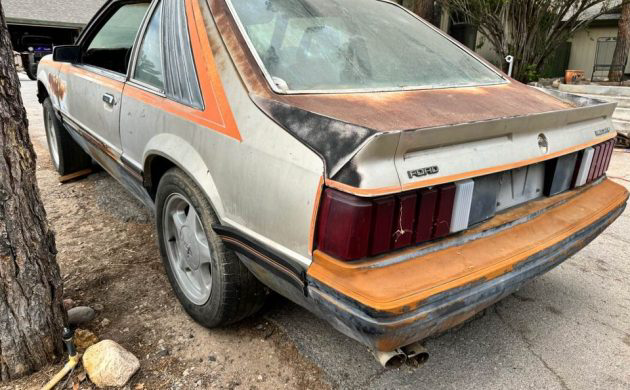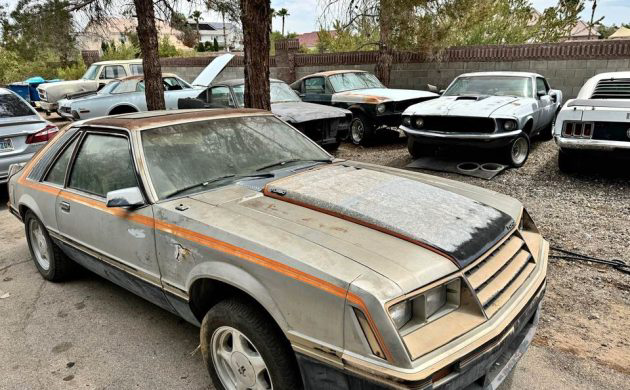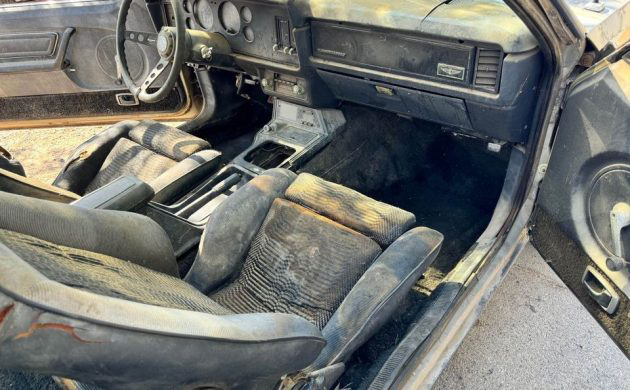Rough Road Since Indy: 1979 Ford Mustang Indy Pace Car
When the new Mustang debuted in 1979, Mustang fans rejoiced. The Pinto-based compact Mustang era was finally over, and this Fox-body replacement was more like the first generation cars than any previous iteration. Ford’s triumph was celebrated by being named the pace car for the 1979 Indianapolis 500. Of course, a special pace car edition was offered in showrooms to capitalize on the notoriety and to draw customers to dealers to see the new pony car. Decades later, Fox-body Mustangs are hot collectibles, and even rough examples like this 1979 Ford Mustang Indy Pace Car for sale on Facebook Marketplace in Las Vegas, Nevada draw the attention of collectors. With an asking price of $2,499, can this scraggly, engine-less car find a new home given the tremendous amount of work needed to restore it? Or, is this a good start on a modified Mustang with a pace car theme?
The title of “Indianapolis 500 Pace Car” has been a long tradition at the Brickyard. For much of its history, the Indy 500 was the most popular race in the world with the possible exception of LeMans. Such lost nameplates as Stoddard-Dayton, Stutz, Premier, and Packard paced the race in its infancy. As the race evolved into as much of an American spectacle as a race, the prestige of pacing the race became a marketing tool for both the speedway and the domestic automobile manufacturers of the period. As you look over a long list of brands that have been bestowed the honor, every car listed is now a collectible. As the speeds required for the job have increased, the privilege now requires a very fast car. Since 2004, the pace car has either been a Chevrolet Camaro or a Corvette.
At the head of the 35 race cars for the 63rd Indianapolis 500 on Sunday, May 27 was a Mustang very similar to the one you see in the pictures. There are usually modifications made to perform the duties of a pace car, such as a more powerful electrical system, and a set of lights to signal the race drivers that the pace car is on the track. It is also reasonable to assume that the drivetrain was built up for additional power and reliability given that the race was one of the most widely watched sporting events of the year. On the outside, the car’s paint color was listed as Pewter with red and black accents and a decal package to alert everyone that you had spent $over $9,000 on this special edition Mustang. The car also wore a cowl hood that offered no performance enhancements, an air dam under the front bumper, fog lights, an enhanced suspension, and a three-piece rear spoiler. Customers could also choose from either a turbocharged inline four-cylinder or a V-8 under the hood. The standard transmission was a four-speed manual, but an automatic was available to those who chose the V-8. In all, 10,479 of the cars were produced.
That number is fairly high for a special edition pace car compared to the production of other cars given the honor. 1979 Ford Mustang Pace cars like this one do pop up from time to time and seem to have a survival rate comparable to V-8 Mustangs of the early Fox-body era. This one is in rough condition, but the seller tells us that the body is almost free from rust except for some spots on the roof. We are also told that an examination of the car suggests that it has never been in a major accident. That also suggests that it may have endured a minor fender bender but no specifics are given.
Despite the low level of rarity and high level of collectibility, there are issues to deal with if you decide to purchase this Mustang. The ad does not state if this was originally a four-cylinder or V-8 car, but that it was originally a manual transmission car. The condition inside and outside will require either a full restoration to stock or an extensive refurbishment to make the car into what you want it to be. It rides on a later set of Mustang rims. However, the seller will include the original rims at no charge. Another interesting item on the car is the sunroof. By the way, it was cut into the roof, it appears to be a factory option rather than one of the many aftermarket sunroofs that ruined many a car in the eighties. Does anyone remember if Ford offered a sunroof in the Mustang in 1979?
The big issue would be deciding how to proceed with this car. Those who love to modify Fox-body Mustangs tend to gravitate towards cars that were produced near the end of the car’s production run in 1993. Early cars are neat to see at car shows but are not very plentiful. Seeing a restored pace car would be a treat and the seller has a picture of a set of decals for the car in a box ready if the next owner decides to restore the car. Perhaps obtaining a Marti Report on the car would be a smart first move before any money was invested.
What would you do with this car? Please share your thoughts in the comments.
Auctions Ending Soon
 2002 Subaru Impreza WRXBid Now2 days$333
2002 Subaru Impreza WRXBid Now2 days$333
 1975 Chevrolet Corvette ConvertibleBid Now2 days$4,000
1975 Chevrolet Corvette ConvertibleBid Now2 days$4,000
 1964 Ford F-100 Camper CustomBid Now2 days$2,000
1964 Ford F-100 Camper CustomBid Now2 days$2,000
 2006 Jeep Wrangler SportBid Now4 days$10,500
2006 Jeep Wrangler SportBid Now4 days$10,500
 1974 Datsun 260ZBid Now6 days$750
1974 Datsun 260ZBid Now6 days$750







Comments
Jeff, re: your second sentence. Yes it was a compact Mustang era in the mid 70’s, but the Mustang II (the point of your reference) was NOT “Pinto-based”.
The Indy 500 pace car replicas were eye-catching efforts, and a good start for the Fox era. But they are not particularly rare. There are better ones around, for not a ton of money.
The “Flip-Up Open Air Roof” was an option.
A Marti Report is always a good idea.
If this has a future, it is likely to be in the form of a restomod of some flavor.
I can answer one of the questions, and throw a wrench in Bob’s comment. Sorry Bob, I’m not trying to start a fight. I do believe the 1979 Pace Car came standard with the sun roof. The ‘real’ pace cars they would use at the INDY 500 had to have T-tops so Jackie Stewart, or whoever, could stand up inside the car and wave a flag, or whatever they do up there. FORD did not want to put T-tops in the 10,000 street cars but they did agree to a sunroof, standard equipment. I think. So the one thing I do know, this was a four banger engine from the factory. On the hood, on the back of the scoop is a little chrome emblem that says TURBO. Meaning 4 cyl.
Good clarification. My note was meant to simply state that sunroofs were available in 1979 Mustangs.
Several years ago I went past a rural Ford-centric salvage yard in southern Ohio which had a whole row of these. I recently went past again, and they are all gone. I wonder what happened to them.
Refrigerators
Even though $2,500 isn’t particularly expensive for a car with a strong following, 7 weeks on the market in an area with a couple of million people puts an exclamation point that there is little to no interest.
Steve R
This was a turbocharged 2.3, and all pace cars had sunroofs. This guy is rough and needs everything. With very nice examples fetching 20-20k, you will be upside down real quick with this one and still won’t have a/c. Really cool looking car when new.
This car is gross, the seller obviously thinks so since he is a Mustang guy and does not want it.
I’m with Connecticut mark. I believe it’s telling in an ad, if your selling, say a Mustang and have a crap ton of them in the background photo’s that you deem worthy of your time………..what does it say about the one you are getting rid of???????
I believe it’s just not worth the time and energy, that’s why the owner is giving up on it.
The one cool aspect of the pace cars were the Recaro seats.
Precisely. Passed on a chance to get a set for about $200 about 10 years ago. Should’ve grabbed them.
Love the fox body Mustangs! And Pace cars are special commemorations of the Indy 500. I say restore it to original and enjoy it while you have it.
Someone that’s more interested in bringing these back to life may find it a worthy project.
Good luck to the new owner.